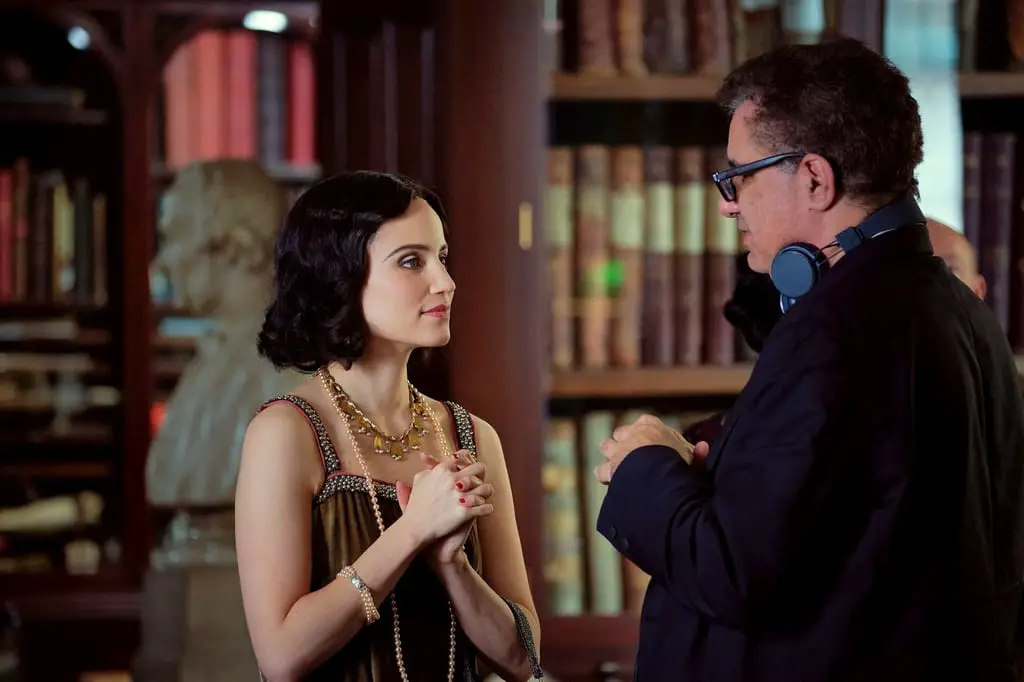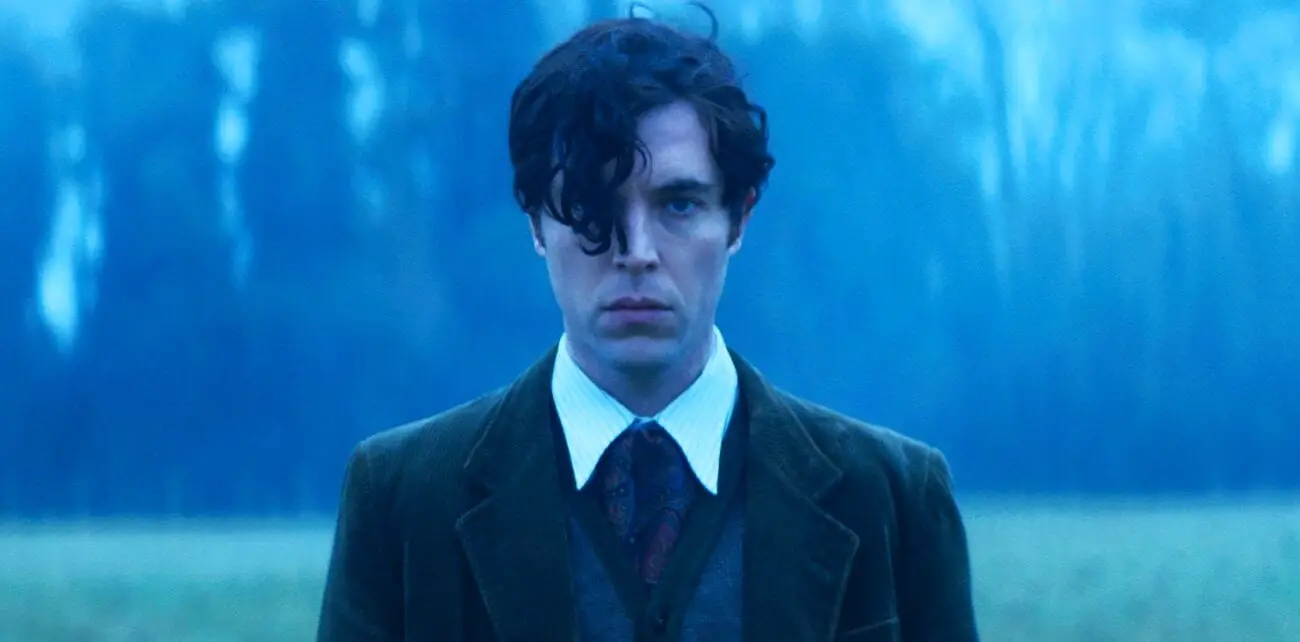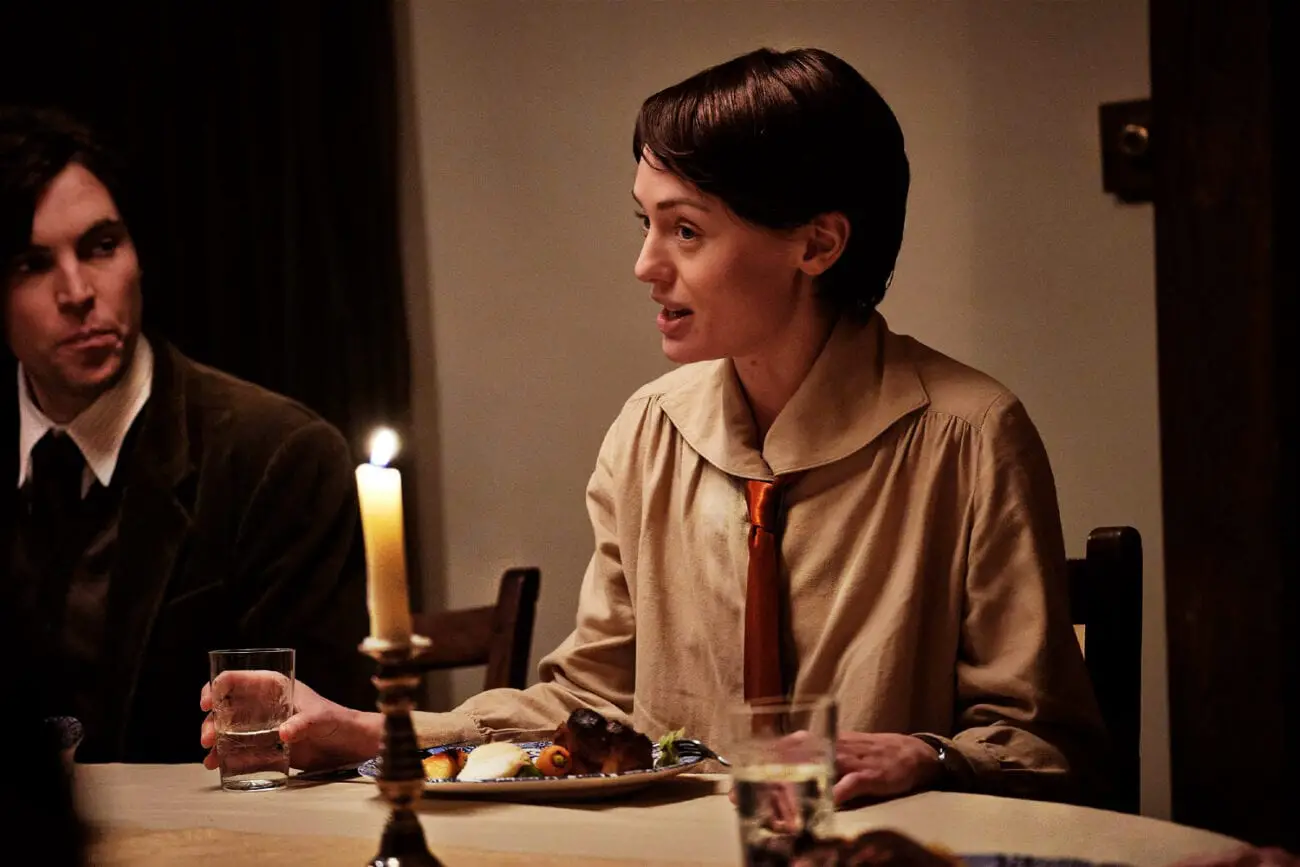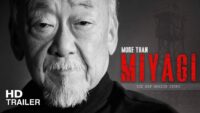The Laureate stars Tom Hughes (Victoria), Dianna Agon (Glee), Laura Haddock (Netflix’s White Lines), Fra Fee (Les Misérables) and Julian Glover (Indiana Jones and the Last Crusade) in this romantic drama about British war poet Robert Graves (Hughes) and the women in his life, wife Nancy Nicholson (Haddock) and American writer, Laura Riding (Agron) who served as his muses in London during the 1920s.
William Nunez, a graduate of NYU film school and a former TV news director, wanted to film this story for many years. As an admirer of Grave’s written works, Nunez was equally interested in exploring the topics of desire fuelling creativity and how PTSD affected individuals after the war. With his background in news and passion for history to aid Nunez in authenticity and getting straight to the heart of his characters, and with the cooperation of members of Graves’ family, Nunez has now made his literary ménages à trois, The Laureate. He spoke to us about the long journey to bring the movie to screens.
Jason: Can you tell me a bit about how you got involved with The Laureate and what appealed to you about the story of Robert Graves?
William Nunez: The Laureate has been a long gestating project of mine. The genesis of it started back in the ’90s. Robert Graves was always my favorite writer, mainly because as a kid I would watch I, Claudius, which was shown on public television once a year. My mother had a book of his and as I learned more about Grave’s work, I loved it. In the ’90s, I read a biography of his and knew he lived in Majorca, Spain, but that was about it. I read about his partnership with Laura Riding and thought it might make an interesting movie, but I was just out of university and was young, and didn’t think I was authoritative enough to write and direct something with these adult themes and relationships. So I put it away for a while and over a decade later, I came back to it.
Jason: What was it about Robert Graves that compelled you so much to want to bring his story to the screen?
William Nunez: I’m always fascinated by creativity and whether it’s a painting, piece of music, or a book, the struggles and the internal conflicts and inspirations that artists go through interest me. That’s what drew me to Robert. He needed a muse, in order to create his expressions and his first wife, Nancy, was one and then Laura Riding became his next one. And even after he broke up with Laura, he continued with that practice. It fascinated me how we need conflict, which I guess most artists do in a way to create and The Laureate has a lot of conflict in it, which is a kind of outrageous, but that is how he transitioned himself from the well-known war poet to author which is what he became known for in poetry circles, aside from Goodbye To All That and I, Claudius.
Jason: Can you describe the methods of research you underwent in order to depict the 1920s on film?
William Nunez: The history I already kind of knew, but since I knew what my budget would be, I needed to be contained. I mainly researched production design and the fashions of the time, the mannerisms, even to how the light switches looked like. I try to get it as accurate as possible. In terms of the history, I knew what it was anyway, because history has always been my other passion. And I just went into my research trying to get all the minor details right so that people can go, ‘okay, these guys got these little bits right, and they got the era right, in the language of everything correctly.’ So that’s where my research mainly laid for this project.

Jason: Can you tell me what kind of budget you were working with?
William: It ended up being about two million pounds. So a little under two and a half million dollars. And we had a 22-day shooting schedule, which is a record from what I gather. But I’d like to think that my news and documentary background helped me plan. That doesn’t mean I would like to do it again. But I’m happy how in those tight 22 days, we didn’t cut any corners.
Jason: Do you as a filmmaker employ any specific techniques to make a limited budget look way more?
William Nunez: Just to find locations that are ready-made and ready to go. So that is a trick right where you have to do the least amount of work. We found the place in Wallingford, which is up in Oxford, which I think the movie Christopher Robin was filmed in. It’s a cottage that’s 200 years old, and they had a perfect fireplace and not much had changed. They kept the rugs and the tapestries in the study room where everything looked authentic, and we didn’t really have to move or build anything. We just moved in some bits of furniture and that kept the budget low. We used a place called the Liberal Arts Club, which is in Whitehall, which is right by The Thames. You can see the gigantic Ferris wheel across the river, but it’s literally by 10 Downing Street. In this club, we didn’t really have to do anything except cover up the fire exit signs. My other advice is to partner with a good post-production house, whether it’s in the UK, Canada or the US.
Jason: These period projects, they look great on film, and when you can use actual environments it adds much more, then when you build a set from scratch.
William Nunez: That is very important to me. We only had 22 days, and it was like an army moving from location to location, and we made it work. The thing is I pushed and pushed hard for it. Because shooting in these actual environments gives it a production value that goes beyond what the actual budget was. It gives authenticity to the period. The trick is too just to find an environment that adds production value that’s ready-made to go in there and shoot.

Jason: And you have actual family members Robert Graves to cooperate and even act in this movie. How did you convince them you were the right guy to tell this story?
William: I think they were pretty impressed I knew a lot about Robert, his motivations and things like that. I mean, it was tricky. It’s interesting, because Graves was married twice. And he had four sets of children. He remarried after Nancy and had four other children, and three of them are still alive. But where I tell my story, they weren’t around. So they were removed from that. Our conversations lasted over a couple of years, we went out to many dinners when I would be in London or in Spain. and they just grew to like me and believed that I could pull this off. And then it also helped that I had Julian Glover whose Robert Graves Godson. Laura Riding actually set up his parents in New York in the ’30s. So I think all that comforted the family.
Jason: That’s an incredible story, how they believed in this, in this project, and Glover, I guess you could say, gave it his blessing.
William Nunez: There’s a story that Julian tells, in the behind-the-scenes footage that we have, where we were shooting a scene, a dinner scene, and Julian in between takes said to me, ‘William, instead of water can I have a glass of Irish Whiskey or something?’ And I said, ‘No, no, they were teetotalers.’ and he was like, ‘oh, you’re right. I totally forgot.’ I think that impressed him. He brought in Laura Riding’s jewelry box full of her writings, he brought in a chair that Robert Graves got dressed in every morning. So he had all that, and he would impart information to our young cast. But for me, he would show me photos, and I’d go ’yeah, yeah, I’ve seen it.’ So I think he got a bit frustrated that he couldn’t get me on something.
Jason: It’s clear the actors had a great time being a part of this movie. Can you tell me a little about how the lead actors were chosen?
William Nunez: Like any independent film, it takes a long time, and I had another set of actors originally attached. And then schedules got in the way for them or the financing didn’t come through. It was back and forth. Once we had the financing, we couldn’t get the actors or vice versa. However, I met Tom Hughes who auditioned for the role of Jeffrey, actually. When I met him a couple of years ago, I thought ‘Oh my god, he looks like Robert Graves.’ We hit it off very well. We had a good meeting, and I’d keep him in mind. Then the other actor didn’t come through. I immediately called Tom and he was doing Victoria. So we had to wait, not once, but twice for his shooting to be over because he had first call, and two seasons to do. So that’s how we got Tom, For Dianna Agron, we actually got her through our agent at CAA who introduced us. We had a meeting in New York and hit it off. I felt that she was a really wonderful actress that needed to be given a part that can showcase what she can do. And it’s not just what’s there in Glee. I believe that she is actually a legitimately talented actress. And I think she really delivers in this.

Jason: And how did the casting of Laura Haddock as Nancy happen?
William Nunez: By coincidence, Dianna was at a wedding in Italy with Tom. She was there with Laura Haddock who read the script and knew about the project and was interested in talking to me. And I was interested in talking with her. So we Skyped a few days after that. And sure enough, I hired her. It was like the clouds parting that I got this wonderful cast. And the good thing about the cast that helped in this 22 day shoot is that they were all comfortable with each other, they were all legitimate friends outside this. And they were comfortable in doing the scenes that were required of them. You don’t have to spend a lot of time convincing X or Y actors to do something because they got it; they trusted each other.
Jason: That’s great how you landed these particular actors and how they all believed in this project and to your point about Diana, I saw her in the Robert De Niro, Michelle Pfeiffer movie The Family and felt she had some major talent. And I think it’s great that people are now going to see that side of her. This is a more broad question, but you have a contemporary cast, however, contemporary movie-going is pretty much now dominated by comic book movies. What might a challenge be in getting a movie like this seen by the public?
William Nunez: That’s a good question. I think this movie has a universal theme. It is a love story. I like to say if they were plumbers I think this would still resonate with a young audience who are idealistic and passionate and at a fork in the road trying to decipher what to do with the rest of their lives and how their relationships with each other fit into these decisions they make, good or indifferent. I think that’s something that young people can relate to, and especially with the events that are going on now, where you have two strong female characters, Nancy Nicholson and Laura Riding. One was an ardent feminist where she dressed almost like a man and had short cropped hair and dressed in an androgynous manner, was a striving feminist and believed in equal pay and women’s suffrage. Then you have another pro woman and Laura played by Dianna, uses her femininity to advance her cause and then there are those roadblocks that both of them stumble through. I think that’s something that’s relevant in the conversation today. And hopefully, that is something that would get people out to see it. it’s just a good old-fashioned story done in the good old-fashioned film-making way. It feels like an old movie, but in a good way. I think it’s a good two hours audiences will enjoy.
Jason: With all the options now for audiences to discover movies, do you think it’s easier to get these movies seen now compared to, I would say, the mid-90s Miramax era?
William Nunez: Yes, but I also have to know that I have to pay back my investors. So you want to make sure that you put it across a distribution platform that would get my investors’ money back, so you have to be wary about that. Of course, nowadays, with self distribution, anybody can do distribution platforms. However, I couldn’t pay any advance rights to films. So the trick is to find those kinds of streamers who will give us the rights ahead of time, so I can pay back my investors, and it’s not a high budgeted movie but, you still have to weigh the commerce versus just trying to get it out there.
Jason: When it comes to your background in news, do you feel that that sort of led to you wanting to portray the era as accurately as possible?
William Nunez: Yes, as accurately as possible, but I’m very aware of the time constraints. I only have a little under two hours to tell a story that took place over two years. So it’s not a documentary, and that’s one thing the Graves family understood, which I’m grateful for. It is my version of the events and my goal is to portray an essence of Robert and an essence of the situation of the characters so that people can identify with them. If someone never heard of Robert Graves or Laura Riding, and they pick up a poem or read a book of theirs after the movie is over, that’s a great thing we want people to discover.
Jason: Are they films and filmmakers you personally look to for inspiration?
William Nunez: I don’t have favorite movies as I have favorite filmmakers because what attracts me to Robert Graves or attracts me to musicians or anybody creative, it’s the same with filmmakers. It’s their complete history because no two films are alike by a filmmaker. I’ve always been a fan of the giants like Orson Welles and Stanley Kubrick and Pedro Almodóvar. They’ve been my major inspiration. I’ve also liked their visual styles, but then I’ll also go for great writer, directors like Whit Stillman, or Alexander Payne who are favorites of mine as well. I look at all five filmmakers for different things that I draw upon.
Jason: What has the reaction been from people who’ve seen The Laureate so far?
William Nunez: They’ve loved it. It’s weird because as I’ve seen it over 1000 times while making it. I feel that I have no perspective anymore. People think I’m being disingenuous. When I act surprised when they say it’s good. So yeah, it’s been very positive. When I returned from the UK in late October, I did a test focus screening in New Jersey with ten women that age ranged from 18 to their late 50s and 60s, and they all loved it. And they didn’t even know what the movie was about, they were just shoved into this cinema, of course, socially distanced, which was why there were only ten. The feedback was very positive.
Jason: And you completed post-production in 2020 during COVID-19, and from what I saw on the movie’s Facebook page, it looks like this was completed rather recently?
William Nunez: We wrapped around the 13th of February and I took about a week and a half to recharge in Spain. Then I edited with my editor in New York City for about two-and-a-half weeks until the lock-down happened. And then we had to edit remotely. We got it done. It was a long process. But we got the picture locked around the second week of June. And then I had to quarantine in the UK for about two weeks. But I was working with the VFX teams and the grading team and the sound team, things like that. And then I was in London for about two months to finish all the major parts of the picture. So we delivered the movie November 6, so yeah, it’s all recent.
Jason: What’s your release strategy right now in the future?
William Nunez: We’re going to premiere it at the Berlin Film market. I mean, it all changes daily. COVID-19 is really changing everybody’s strategy. So right now, it would be to premiere it to buyers from different countries. There is the European film market, of course. Unfortunately, it’s virtual, which is not the greatest. It’s not the same as having one-on-one discussion with buyers from Japan or Sweden to sell them on the greatness of the movie. We’d like to get it to a festival, so we can give it a festival platform to give it that kind of industry validity that would get it reviewed, and then it can spring to a higher distribution platform from there. Everything’s being planned in the first two months of this New Year.
Jason: And Dianna has nearly two million followers on Instagram, so I hope that helps in getting a word out about your film and that audiences can see it. Thank you for speaking to us and best of luck with The Laureate.
William Nunez: I really appreciate it. Thanks so much.
https://www.youtube.com/watch?v=zfx1mIyZv0Y


